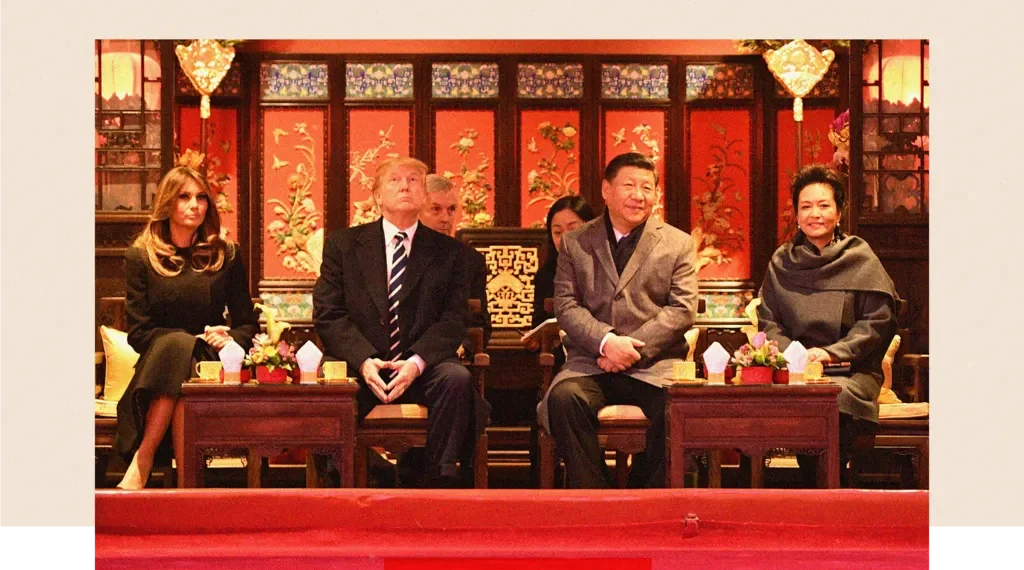Trump and Xi Jinping’s Relationship: Can They Rebuild Their Bonds?
In a sports park near Beijing’s Temple of Heaven, a group of pensioners are exercising, enjoying their retirement after decades of contributing to China’s rapid economic rise. The park, once a site for Chinese emperors to pray for a good harvest, now serves as a recreational space for the country’s older generation.
Among the retirees is a 74-year-old man who expresses concern about the future, particularly with the policies of U.S. president-elect Donald Trump. He, like many, is wary of Trump’s promises to impose high tariffs on Chinese imports, which could threaten the nation’s export-driven economy.
While many in China view Trump as a figure of amusement, with memes of him dancing to the YMCA circulating widely on social media, others see him as an unpredictable leader. “I like Trump, but he’s unstable,” says one pensioner. This unpredictability is amplified by Trump’s cabinet choices, including figures like Marco Rubio, who has called China the “threat that will define this century,” and Mike Waltz, who advocates for countering the Chinese Communist Party. Both of these appointments signal a potentially harsher stance on China.
However, Beijing is not caught off guard by Trump’s return. Jie Yue, a senior research fellow at Chatham House, notes that China has been preparing for a second Trump term and warns of an ongoing “roller-coaster relationship” between the two nations.
A Cold War Looms?
Tensions between the U.S. and China have been escalating for years, particularly during the Biden administration, due to issues like tariffs, the Russia-Ukraine conflict, and Taiwan’s future. Despite these disagreements, diplomatic talks have continued. During his final meeting with President Biden, Chinese President Xi Jinping warned the U.S. against starting a “new cold war,” stressing that containing China was “unwise and bound to fail.”
China’s view of the U.S. is shaped by actions such as tariffs, restrictions on access to advanced technologies, and military alliances in the South China Sea. With the selection of Rubio and Waltz, Trump’s administration appears set to adopt a more aggressive, uncompromising policy toward China.
Growing Nuclear Threats and Military Tensions
China’s rising military might, including the largest standing army and navy in the world, has raised concerns in Washington. As China expands its nuclear arsenal, the U.S. is beginning to view China as an even greater threat. Satellite images show evidence of China’s work on nuclear-powered aircraft carriers, sparking fears of a new nuclear arms race.
“Unless Trump personally intervenes,” says Tong Zhao from the Carnegie Endowment for International Peace, “the two nations may soon find themselves in a more intense nuclear competition, with far-reaching consequences for international stability.”
Taiwan and the South China Sea
China’s territorial ambitions under Xi have become more assertive, especially regarding Taiwan and the South China Sea. China views Taiwan as a breakaway province and has been ramping up its military presence in the region. The key question is whether the U.S. would defend Taiwan if China moves to invade, especially under Trump’s leadership.
Trump has been reluctant to make firm commitments on military action, suggesting that his unpredictability might deter China from aggressive moves. However, experts predict that the U.S. will continue providing military support to Taiwan, as it is legally obligated to do.
Trump’s Relationship with Xi: Admiration Amidst Tensions
Despite their differences, Trump has publicly expressed admiration for Xi’s leadership style. In 2020, Trump declared that he and Xi “love each other,” even as trade tensions between the two countries escalated. Xi, on the other hand, has largely remained silent on his personal relationship with Trump, though Chinese state media have occasionally made sarcastic references to the U.S. president.
Both leaders project a form of muscular nationalism: Xi’s vision is the “great rejuvenation of the Chinese nation,” while Trump champions the idea of “making America great again.” However, this rhetoric has led to sharp trade disagreements, with Trump proposing 60% tariffs on Chinese goods—something Beijing is not eager to repeat.
A Chance for Diplomacy?
Despite the tough rhetoric, China’s leadership may still seek to improve relations, particularly with Trump’s focus on trade. With the influence of business figures like Elon Musk, whose company Tesla relies heavily on China for production, Beijing may hope to temper Trump’s more aggressive trade policies.
Some experts believe that Trump’s second term could provide an opportunity for China to assert its dominance on the global stage. Under Biden, the U.S. worked to strengthen alliances in Asia, aiming to counter China’s influence. But Trump’s “America First” doctrine has weakened U.S. alliances, which could play into China’s hands as it seeks to expand its global presence.
China is already building alliances with emerging economies and working to repair relations with the UK and Europe. As the U.S. influence wanes, Xi Jinping may see this as a chance for China to rise as a dominant global power.
Conclusion
The relationship between Trump and Xi Jinping, once characterized by mutual admiration, has become strained as both countries pursue increasingly competitive and aggressive policies. With the U.S. focused on China as a threat to its security and economy, and China asserting its dominance, the next few years could mark a critical period in the U.S.-China relationship. Whether Trump and Xi can rebuild their bond, or if the world will see a more confrontational era, remains to be seen.
This article was rewritten by JournosNews.com based on verified reporting from trusted sources. The content has been independently reviewed, fact-checked, and edited for accuracy, neutrality, tone, and global readability in accordance with Google News and AdSense standards.
All opinions, quotes, or statements from contributors, experts, or sourced organizations do not necessarily reflect the views of JournosNews.com. JournosNews.com maintains full editorial independence from any external funders, sponsors, or organizations.
Stay informed with JournosNews.com — your trusted source for verified global reporting and in-depth analysis. Follow us on Google News, BlueSky, and X for real-time updates.













